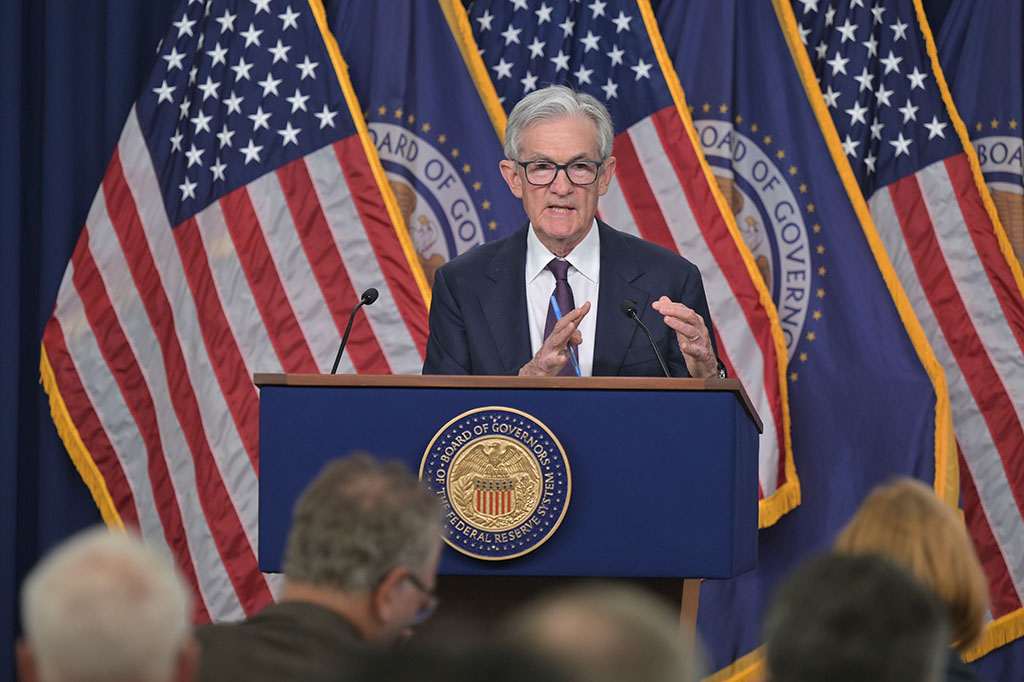.png)
The Morning Edge: Fed Signals Strategic Rethink Amid Era of Persistent Supply Shocks
A newsletter designed to prepare you for the day, offering a concise summary of overnight developments and key events ahead that could influence your workday.

May 16, 2025 at 1:22 AM IST
QUICK SNAPSHOT
Global Sentiment: Risk-on
Factors: US-Iran Deal Optimism
TODAY’S WATCHLIST
- Eurozone March Trade data
- US April Housing Starts data
THE BIG STORY
In a candid reassessment of the Federal Reserve’s policy framework, Chair Jerome Powell on Thursday acknowledged that the central bank may need to fundamentally revisit how it approaches both employment and inflation in the face of a shifting economic landscape. Speaking at the opening of a two-day conference reviewing the Fed’s 2020 strategy, Powell warned that the US could be entering an era of more frequent and potentially longer-lasting supply shocks posing fresh challenges for both the economy and central banks. The current policy framework, designed during the pandemic’s economic fallout, may no longer be fit for a world marked by heightened global instability and persistent price pressures.
Although Powell avoided commenting directly on current rate policy or short-term outlooks, he did note that April’s core PCE inflation likely eased to 2.2%—a relatively mild figure, though not yet reflecting the impact of looming tariff-related price increases. Still, Powell described the post-pandemic disinflation without severe job losses as a “historically unusual result,” marking a rare soft landing under the Fed’s current approach. With unemployment at 4.2%, slightly above last year’s level but still consistent with full employment, the Fed now faces the challenge of adapting its long-term policy playbook to an increasingly unpredictable world.
DATA
US retail sales growth slowed sharply in April, rising just 0.1%, as the impact of consumers front-loading vehicle purchases ahead of tariffs faded and broader spending weakened amid economic uncertainty. The slowdown reflects lingering apprehension over President Donald Trump's shifting tariff policies, with companies like Walmart refraining from financial guidance. On a year-over-year basis, retail sales were up 5.2%, but categories such as auto dealerships down 0.1%, sporting goods was down 2.5%, and miscellaneous retailers declined 2.1%.
Separately, Japan’s economy contracted for the first time in a year during the March quarter, shrinking at a faster pace than expected and highlighting the vulnerability of its export-driven recovery amid escalating US trade tensions. Preliminary government data released Friday showed real GDP fell at an annualised rate of 0.7% in the January–March period, well below the median forecast of a 0.2% decline. This follows a revised 2.4% growth in the previous quarter.
WHAT HAPPENED OVERNIGHT
US stocks ended mixed on Thursday as strong gains in Cisco Systems were offset by a sharp drop in UnitedHealth. Cisco rallied after issuing an upbeat forecast, while UnitedHealth plunged 11% to a five-year low following report of a federal criminal investigation into possible Medicare fraud — though the company said it had not been informed of any such probe. Walmart slipped 0.5% after warning of upcoming price hikes due to tariffs, despite beating first-quarter US sales expectations. Amazon, also vulnerable to trade tensions, fell 2.4%, dragging down the Nasdaq.
Yields on US Treasuries slipped to 4.45% after briefly touching a three-month high of 4.55% earlier in the session, as wholesale prices declined for the second consecutive month. The producer price index fell 0.5% in April, reinforcing the recent softening trend in inflation. Additionally, the control group for retail sales unexpectedly contracted, as consumers showed caution in the face of ongoing tariffs. Despite Thursday’s dip, yields remain over 35 basis points higher since the start of May, driven by optimism over growth.
The US dollar slipped on Thursday following a batch of economic data that signalled weakening consumer momentum. Retail sales in April edged up just 0.1%, falling short of expectations and reflecting softer household spending amid an uncertain economic backdrop. The dollar index dipped 0.11% to 100.89 after falling as much as 0.43% during the session, while the euro edged up 0.02% to $1.1176.
Brent crude oil prices fell on Thursday as expectations grew for a US-Iran nuclear deal that could ease sanctions and boost global supply. Brent crude settled down $1.56, or 2.36%, at $64.53 a barrel, while US West Texas Intermediate dropped $1.53, or 2.42%, to $61.62.
Day’s Ledger
Economic Data:
- Japan Jan-Mar GDP data
- Japan March Industrial Production data
- Eurozone March Trade data
- India weekly FX Reserves
- US April Housing Starts data
- US University of Michigan survey of consumers for May
Corporate Actions:
- Jan-Mar earnings: Bharat Heavy Electricals, CreditAccess Grameen, Delhivery, Emami, Hyundai Motor India, Jubilant Pharmova, Kalpataru Projects International, NAVA, Sammaan Capital, Shipping Corporation of India
- Blue Coast to consider allotment of equity share
- Continental Securities to consider convertible warrants into an equal number of equity shares
- Dhampur Sugar to consider buyback of equity shares
Policy Events
- BoJ Board Member Nakamura Speaks
- ECB's Lane Speaks
TICKERS
- Alkem subsidiary reports cyber incident involving fund transfer fraud
- Bajaj Auto to infuse €125 million into Netherlands arm by May 20
- Cochin Shipyard profit up modestly despite strong revenue growth
- Crompton Greaves Jan-Mar PAT up 5.9% YoY at ₹1.71 billion
- Infosys extends digital services deal with Norway’s DNB Bank
- Larsen & Toubro raises stake in E2E Networks to nearly 19%
- Neuland Labs Jan-Mar consolidated PAT slumps 58.8% YoY; revenue down 14.7%
- Page Industries logs strongest PAT growth in 11 quarters, tops estimates
- RVNL wins ₹1.16 billion railway electrification order
- South Indian Bank PAT up 19% YoY, boosted by other income
- Tube Investments PAT dragged by higher expenses, tax costs
- Vodafone Idea Moves SC Seeking ₹300-billion Waiver in AGR Dues
MUST READ
- IndusInd Bank fiasco: ₹6.74 billion wrongly booked as interest in MFI biz
- India-US trade pact talks moving forward smoothly: Commerce Secretary
- AIFs seek SEBI help to address inter-regulatory issues and ease norms
- 1st monthly labour force survey pegs April unemployment rate at 5.1%
- Nothing will happen until I meet Putin: Trump on Russia-Ukraine peace talks
- Singapore's GIC seeks approval from CCI for 2.14% stake in IPO-bound Groww
- Adani Airports ends partnership with China-based lounge access provider DragonPass
- Trump’s rush to cut AI deals in Saudi Arabia and UAE opens rift with China hawks
- India’s trade deficit expands to $26.42 billion in April



